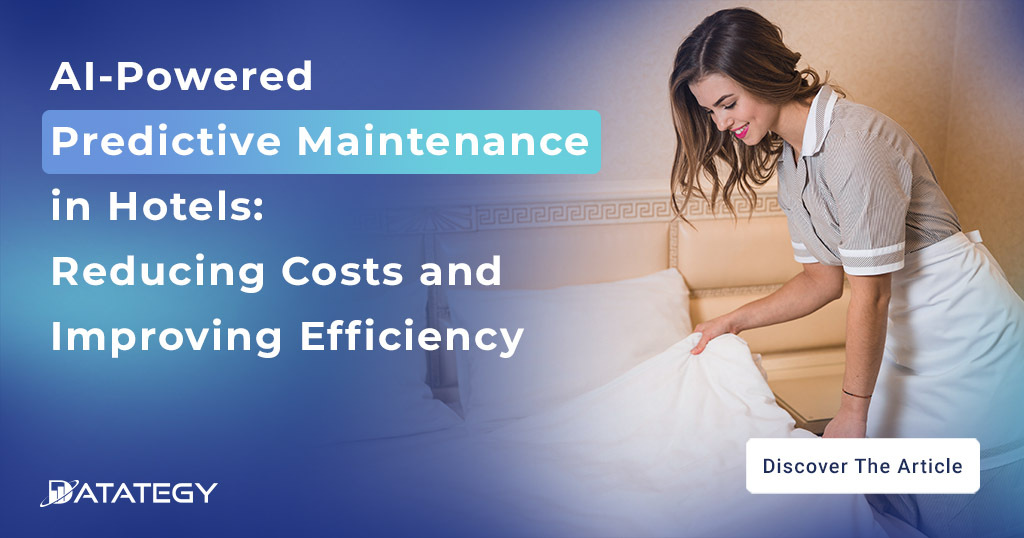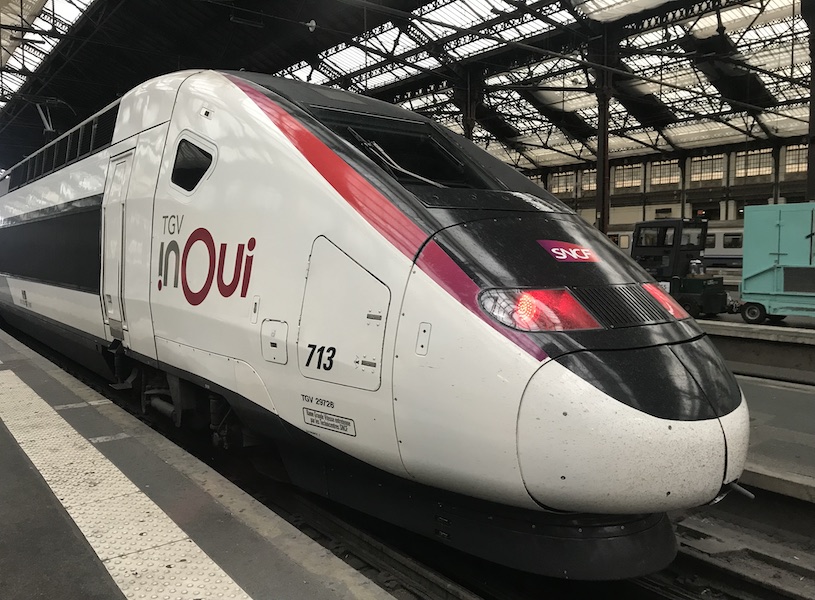Why is Deployment Speed the New 2026 AI Moat? The...
Read MoreAI-Powered Predictive Maintenance in Hotels: Reducing Costs and Improving Efficiency
Table of Contents
ToggleThe hotel industry is one of the oldest and most traditional industries in the world, and it is also one of the most competitive. With the advent of technology, especially artificial intelligence (AI), the industry is facing a major transformation. Artificial intelligence (AI) has the potential to revolutionize the way hotels maintain their equipment and facilities. By using AI-powered predictive maintenance, hotels can predict when equipment and facilities will need maintenance, allowing for proactive repairs and reducing unplanned downtime.

What is predictive maintenance?
In order to schedule maintenance proactively before a failure happens, predictive maintenance is a form of maintenance strategy that employs data and analytics to forecast when machinery or equipment is likely to break. This method contrasts with typical reactive maintenance, which only does maintenance when equipment breaks down or exhibits wear and tear.
Sensors, IoT gadgets, and other technologies are used in predictive maintenance to gather information on the functionality and health of equipment. Advanced analytics techniques, like machine learning and artificial intelligence platforms like papAI, are used to evaluate this data to find patterns and trends that show when equipment is most likely to fail.
Predictive maintenance seeks to maximize equipment uptime while lowering the expenses related to unscheduled downtime. Companies can arrange maintenance at a time that is convenient for them by anticipating future faults rather than being forced to shut down equipment suddenly.
The Benefits of Predictive Maintenance in the Hotel Industry
1- Cost saving
One of the main advantages of predictive maintenance in the hotel sector is cost reduction. Hotels can schedule maintenance during off-peak hours and save money on expensive emergency repairs by spotting possible issues early. Hotels can benefit from predictive maintenance by extending the useful life of their equipment and avoiding the need for expensive replacements.
Predictive maintenance can reduce the need for emergency repairs, which is one of the key ways it can result in cost savings. Emergency repairs might cost up to five times as much as planned maintenance, according to a study by the Uptime Institute. Early detection of possible issues allows hotels to plan maintenance for off-peak hours, avoiding the need for costly emergency repairs.
Predictive maintenance can also help hotels save money by prolonging the life of the equipment. According to a study by the National Center for Manufacturing Sciences, predictive maintenance can extend the life of equipment by 25-50%. By identifying potential problems early, hotels can take steps to address them before they lead to equipment failure, which can save money on replacements.
In addition, predictive maintenance can help hotels save money by increasing the efficiency of their operations. By identifying potential problems early, hotels can schedule maintenance during non-peak times, reducing the need for additional staff and minimizing disruption to guests. This can lead to cost savings in terms of labor and lost revenue due to disruption.
2- Improved guest satisfaction
Making sure that guest rooms are comfortable is one of the key ways that predictive maintenance may increase guest happiness. Predictive maintenance, for instance, can help a hotel’s HVAC system (heating, ventilation, and air conditioning) make sure that guest rooms are constantly at a reasonable temperature, lowering the likelihood of complaints. The American Hotel & Lodging Association found that one of the main causes of visitor complaints was temperature control.
Predictive maintenance can also help hotels improve guest satisfaction by reducing the risk of equipment failure during guests’ stays. For example, a hotel using predictive maintenance for its elevators can ensure that they are functioning properly, reducing the risk of guests getting stuck in the elevator.
By requiring less intrusive maintenance while guests are there, predictive maintenance can also increase customer satisfaction. Hotels should minimize interruption to visitors by planning maintenance during off-peak hours by anticipating potential issues early. This can ensure that visitors have a relaxing and unhindered stay.
Find out how SNCF saves €2.5M/year by using papAI platform in predictive maintenance
Discover papAI platform, a collaborative and scalable AI platform for end-to-end management of your data projects.

3- Increased efficiency
Reducing downtime is one of the primary ways that predictive maintenance can result in greater efficiency. A study by the Uptime Institute found that unplanned downtime can cost firms $260,000 per hour on average. Hotels can boost efficiency by scheduling maintenance during off-peak hours and minimizing downtime by spotting possible issues early.
By lowering the need for additional workers, predictive maintenance can also assist hotels in becoming more efficient. Hotels can reduce the need for additional workers by scheduling maintenance and anticipating potential issues early. This could lead to improved productivity and lower labour expenses.
With enhancing inventory management, predictive maintenance can also result in greater efficiency. Hotels can better manage their inventory and make sure they have the components on hand to conduct repairs by understanding when equipment is likely to fail. This can lessen downtime and boost the hotel’s operations’ general effectiveness.
4- Better use of data and analytics
One of the main ways that predictive maintenance can lead to better use of data and analytics is by providing real-time information about equipment performance. By using sensors and other monitoring devices, hotels can collect data about equipment performance in real-time. This data can be analyzed to identify potential problems and schedule maintenance before they become major issues.
By giving historical data information regarding equipment performance, predictive maintenance may also assist hotels in making better use of data and analytics. Hotels can examine equipment performance over time and spot trends by accumulating data over time. This can assist hotels in operating more efficiently and making better maintenance decisions.
Another way predictive maintenance can lead to better use of data and analytics is by providing a centralized view of equipment performance. Hotels may obtain data from all of their equipment in one location by implementing a centralized monitoring system. This can assist hotels in operating more efficiently and making better maintenance decisions.
5- Enhance safety
The safety and correct operation of all equipment are of highest significance since hotels are liable for the health and safety of both visitors and staff. The risk of accidents and injuries may be considerably decreased by using predictive maintenance to assist hotels to detect possible safety concerns and scheduling maintenance before they turn into serious problems.
Finding possible dangers early on is one of the key ways that predictive maintenance may result in increased safety. For instance, by adopting predictive maintenance for its elevators, a hotel may make sure that they are in good working order and lower the possibility of visitors becoming stranded in the elevator. Similarly to this, a hotel may lower the risk of fire by utilizing predictive maintenance to make sure that its fire protection equipment is in good working order. This can assist hotels in preventing mishaps and injuries while ensuring the security of both visitors and staff.
Predictive maintenance can also improve safety by reducing the need for manual inspections and maintenance. Hotels may get information on the functioning of their equipment in real-time by employing sensors and other monitoring tools. The need for manual inspections and maintenance, which may be risky for the technician, can be reduced by analyzing this data to identify prospective problems and scheduling maintenance before they become significant problems.
Conclusion
Overall, hotels may benefit greatly from predictive maintenance in terms of cost savings, enhanced productivity, better use of data and analytics, and better inventory management. Hotels may take a proactive approach to maintaining equipment and facilities with the correct tools and procedures in place, leading to a more effective and lucrative business.
Interested in discovering papAI ?
Our commercial team is at your disposal for any question.
We Don’t Just Build AI, We Deliver Measurable Impact
We Don’t Just Build AI, We Deliver Measurable Impact Join...
Read MoreAI’s Role in Translating Complex Defence Documentation
AI’s Role in Translating Complex Defence Documentation The defence sector...
Read More

